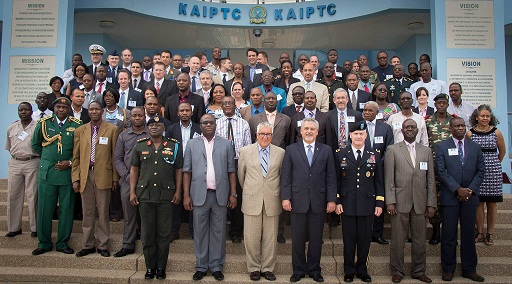The US-Africa Command (US-AFRICOM) Academic Symposium, the sixth in a series, is underway in Accra.
The Academic Symposium is designed to enhance the understanding of US. Africa Command, its mission and its objectives among the academic community.
The Symposium aims to review and analyze key security developments and issues and how they impact security issues in Africa and AFRICOM’s lines of effort and identify “gaps” in the security space, and where there may be pockets of mutual convergence for future partnerships.
It also aims to profile emerging and under-utilized non-traditional security partners, highlight the best practices of existing multi-sectoral security partnerships and identify suggestions for further cooperation between the US-Africa Command and the academic community.
It will serve as a means to solicit the academic community’s input on how best to support peace and stability in Africa as well as help foster an on-going critical dialogue between the academic community and security professionals.
The symposium brings together leading scholars and experts on population-centric security issues that are of shared concern to the US-Africa Command and African countries as well.
About 100 participants with expertise and interest in Africa’s security sector —50 to 80 of whom will represent the universities, non-governmental institutions, think tanks, Kofi Annan International Peace-keeping Training Centre (KAIPTC) Faculty and AFRICOM and component staff— are attending the four-day event from the 23rd to the 26th of June, 2014.
US-AFRICOM is hosting the symposium with support from the KAIPTC on the theme: ‘Perspectives and Partners on Population-Centric Security Sector Transformation.’
Specific sub-topics to be addressed by panelists include: The Civil-Military Relationship, Private Sector Security, Human Rights and Security, Security as Public Service Delivery, Health and Human Security and Environmental Resources and Conflict.
In an address at the opening of the symposium in Accra on Monday, Ghana’s Deputy Minister for Defence, Ebenezer Okletey Teye Larbi, called for the transformation of the security Centre with the appropriate equipment, effective management and a sound security policy as well as a new security legislation to spell out the mandate of the security institutions.
Mr. Larbi also stressed the need for building a reliable global partnership to contain current security challenges.
The United States Ambassador to Ghana, His Excellency Gene A. Cretz, said there was the need for joint security co-operation to serve the civilian population and prevent conditions for conflict.
The Deputy to the Commander for Civil-Military Engagements, Ambassador Phillip Carter III, said the strategies for achieving human security ought to be global.
Ambassador Phillip Carter III noted, however, that without good governance, achieving human security would be elusive.
US-AFRICOM, with its Command headquarters located at Kelley Barracks in Stuttgart-Moehringen, Germany, is one of the six U.S. Defense Department’s geographic combatant Commands and is responsible to the Secretary of Defense for military relations with African nations, the African Union, and African regional security organizations.
US-AFRICOM began initial operations on October 1, 2007 and officially became an independent Command on October 1, 2008.
A full-spectrum combatant Command, US-AFRICOM, is responsible for all U.S. Department of Defense operations, exercises, and security co-operation on the African continent, its island nations and surrounding waters.
US-AFRICOM is part of a diverse interagency team that reflects the talents, expertise and capabilities within the entire US government. The command has four Senior Foreign Service (SFS) officers in key positions as well as more than 30 personnel from more than ten US government departments and agencies, including the Departments of State and Homeland Security and the US Agency for International Development.
In concert with inter-agency and international partners, US-AFRICOM builds defense capabilities, responds to crisis and deters, and defeats transnational threats in order to advance US national interests and promote regional security, stability, and prosperity.
The inter-agency partners of US-AFRICOM bring invaluable expertise to help the command ensure that its plans and activities complement those of other U.S. government programs and fit within the context of US foreign policy.
Source: ISD (G. D. Zaney)
























